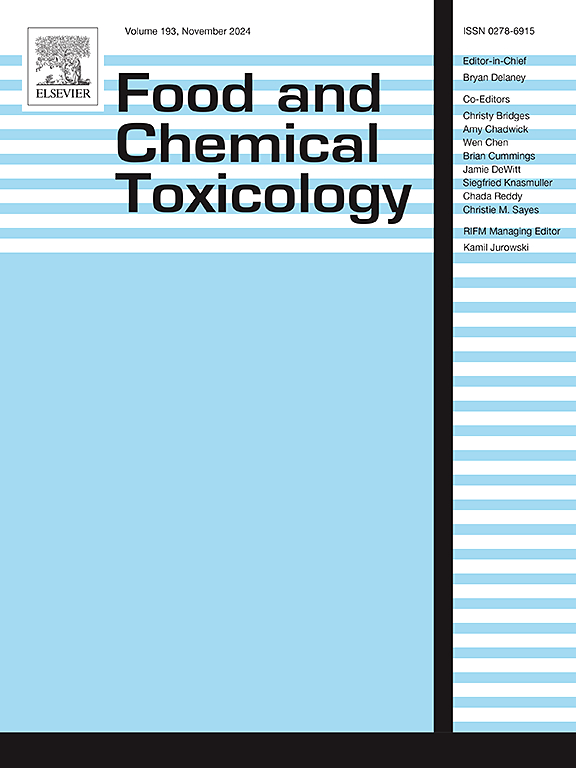在小鼠模型中,维生素C和D不会增加阿司匹林对结肠癌的化学预防作用。
IF 3.9
3区 医学
Q2 FOOD SCIENCE & TECHNOLOGY
引用次数: 0
摘要
阿司匹林对结肠有显著的抗肿瘤作用,而补充维生素C和D的效果则不一致。本研究研究了维生素C和D与阿司匹林对小鼠化学诱导结肠癌的单独和联合作用,重点是氧化还原平衡和DNA损伤。将成年雄性和雌性小鼠分为7组:对照组;1,2-二甲肼组(DMH, 40 mg/kg,每周2次,第4周和第5周);给药组加阿司匹林(水中6 mg/kg);维生素C(水中500毫克/升);维生素D(口服1500iu);维生素C和阿司匹林的组合;以及维生素D和阿司匹林的组合。连续治疗12周。单独或联合处理,减少异常隐窝形成。阿司匹林单独减少了65%的异常隐窝灶(ACF)的形成,并伴随着氧化应激和DNA损伤预防的系统性减少。然而,在阿司匹林中加入维生素C和D并没有增强这些效果。维生素D单独抑制肝脏中ACF的形成和DNA损伤,而维生素C对结肠癌的作用有限,尽管可以减少肝脏和结肠中的氧化应激。总之,我们没有发现任何证据表明补充维生素C和D能增强阿司匹林对结肠癌的化学预防作用。本文章由计算机程序翻译,如有差异,请以英文原文为准。

Vitamin C and D do not increase the chemopreventive effect of aspirin on colon carcinogenesis in a mouse model
Aspirin has significant antineoplastic effects on the colon, whereas the outcomes of Vitamin C and D supplementation have been inconsistent. This study addressed the isolated and combined effects of vitamins C and D with aspirin on chemically induced colon carcinogenesis in mice, focusing on redox balance and DNA damage. Adult male and female mice were divided into seven groups: a control group; a group treated with 1,2-dimethylhydrazine (DMH, 40 mg/kg twice per week during weeks 4 and 5); and groups treated with DMH plus the following: aspirin (6 mg/kg in water); Vitamin C (500 mg/L in water); Vitamin D (1500 IU by oral gavage); a combination of Vitamin C and aspirin; and a combination of Vitamin D and aspirin. The treatments were administered continuously for 12 weeks. The treatments, isolated or combined, reduced aberrant crypt formations. Aspirin alone reduced the formation of aberrant crypt foci (ACF) by 65 %, accompanied by a systemic reduction in oxidative stress and DNA damage prevention. However, adding vitamins C and D to aspirin did not enhance these effects. Vitamin D alone suppressed ACF formation and DNA damage in the liver, whereas vitamin C had a limited effect on colon carcinogenesis, despite reducing oxidative stress in the liver and colon. In summary, we found no evidence that vitamins C and D supplementation enhanced the chemopreventive effects of aspirin on colon cancer.
求助全文
通过发布文献求助,成功后即可免费获取论文全文。
去求助
来源期刊

Food and Chemical Toxicology
工程技术-毒理学
CiteScore
10.90
自引率
4.70%
发文量
651
审稿时长
31 days
期刊介绍:
Food and Chemical Toxicology (FCT), an internationally renowned journal, that publishes original research articles and reviews on toxic effects, in animals and humans, of natural or synthetic chemicals occurring in the human environment with particular emphasis on food, drugs, and chemicals, including agricultural and industrial safety, and consumer product safety. Areas such as safety evaluation of novel foods and ingredients, biotechnologically-derived products, and nanomaterials are included in the scope of the journal. FCT also encourages submission of papers on inter-relationships between nutrition and toxicology and on in vitro techniques, particularly those fostering the 3 Rs.
The principal aim of the journal is to publish high impact, scholarly work and to serve as a multidisciplinary forum for research in toxicology. Papers submitted will be judged on the basis of scientific originality and contribution to the field, quality and subject matter. Studies should address at least one of the following:
-Adverse physiological/biochemical, or pathological changes induced by specific defined substances
-New techniques for assessing potential toxicity, including molecular biology
-Mechanisms underlying toxic phenomena
-Toxicological examinations of specific chemicals or consumer products, both those showing adverse effects and those demonstrating safety, that meet current standards of scientific acceptability.
Authors must clearly and briefly identify what novel toxic effect (s) or toxic mechanism (s) of the chemical are being reported and what their significance is in the abstract. Furthermore, sufficient doses should be included in order to provide information on NOAEL/LOAEL values.
 求助内容:
求助内容: 应助结果提醒方式:
应助结果提醒方式:


